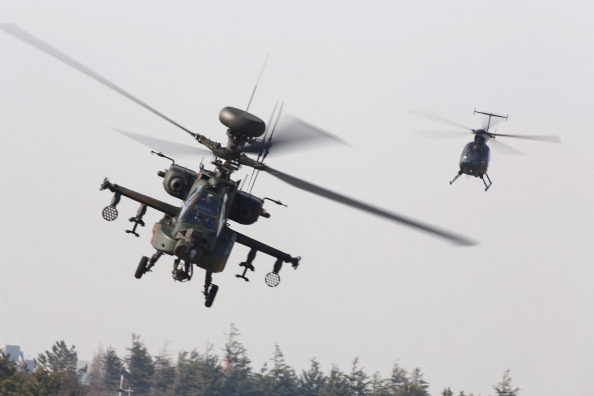
In 2013, Amnesty International documented the use of attack helicopters by Egyptian security forces for surveillance against crowds and protesters. Now, the Obama administration is selling 10 Apache military helicopters to the country (Photo Credit: Ken Ishii/Getty Images).
By Nate Smith, Chairperson – Military, Security and Police Transfers Co-Group, Amnesty International USA
When a government violates human rights on a mass scale – jailing opposition activists and journalists on trumped up charges, arresting hundreds of protesters at once, passing draconian laws to suppress public opinion – they should be held accountable. It’s not always a clear-cut or simple task for the international community, but we must identify some simple dos and don’ts.
Do: Provide support for human rights and government accountability.
Don’t: Sell advanced, highly lethal killing machines to a government engaged in a crackdown on personal freedoms.
Not only does this demonstrate an end to the aid suspension, it provides the Egyptian military with a key weapon that has already been used in bloody crackdowns against civilians.
Back in October 2013, the Obama Administration announced that it was partially suspending military aid to Egypt, depending on the advancement of democratic reforms. Conveniently excluded from this announcement was aid related to “counterterrorism” and security in the Sinai Peninsula.
Not only does the sale of the Apaches demonstrate an end to the “aid” suspension, it provides the Egyptian military with a key weapon that has already been used in bloody crackdowns against civilians. In 2013, Amnesty International documented the use of attack helicopters by Egyptian security forces against crowds and protesters, reportedly employed for both surveillance and intimidation.
The post-Morsi government in Egypt, having committed a wide array of gross human rights violations in a short period of time, should not receive weapons that bear a substantial risk of being used to commit more such violations.
In its own human rights report, the U.S. Department of State describes “excessive use of force by security forces, including unlawful killings and torture; the suppression of civil liberties, including societal and government restrictions on freedom of expression and press and freedom of assembly; and military trials of civilians” committed by Egyptian government forces.
Since the 2013 attacks, Amnesty International has seen little improvement in Egypt that would warrant resumption of arms sales. Safeguards, normally established to curb serious violations of human rights by the security forces and the army, are nonexistent. In contrast, a new protest law, passed in November 2013, provides Egyptian security forces additional powers to use excessive force to disperse demonstrations and other unauthorized public gatherings.
Aggravating past wounds, the Egyptian military has taken no action to show accountability for past human rights abuses or end old patterns of impunity for these abuses. Furthermore, Egypt’s newest counter-terrorism law gives authorities increased powers to muzzle freedom of expression and imprison opponents and critics.
Even Syrian refugees in Egypt can’t catch a break – a boat of over 200 refugees was intercepted by Egyptian security forces and turned back and detained after police arbitrarily killed two people on board. More recently, a court in Egypt sentenced 528 people to death in a single trial – a grotesque ruling that had little to do with justice.
By sending attack helicopters to the Egyptian government, the Obama Administration is undermining the effectiveness of arms export rules regarding human rights. The whole point of arms export rules is to avoid sending deadly equipment to those who may well use such arms to violate human rights.
The violence of 2013 and 2014 has clearly demonstrated to the world that Egyptian security forces are perfectly willing to use unjustified lethal force, torture, arbitrary and mass arrests, and a host of other repressive techniques. No matter where they’re intending to use these new weapons, the Obama Administration is enabling human rights violations abroad by sending Apaches.
It’s time for the Obama Administration to take its obligations as the world’s largest arms exporter more seriously. Administration officials need to make clear their criteria for halting and resuming arms exports, and the criteria need to be consistent with rigorous human-rights standards. Sending such weapons to security forces with a clear and consistent history of human rights violations, and arguably little respect for human life, is undoubtedly crossing an ethical line.
On October 8, Amnesty International USA sent a letter to President Obama, asking him to suspend all high-risk transfers and to embrace transparency in arms exports. He has so far done neither. You can believe he’ll hear from us again.